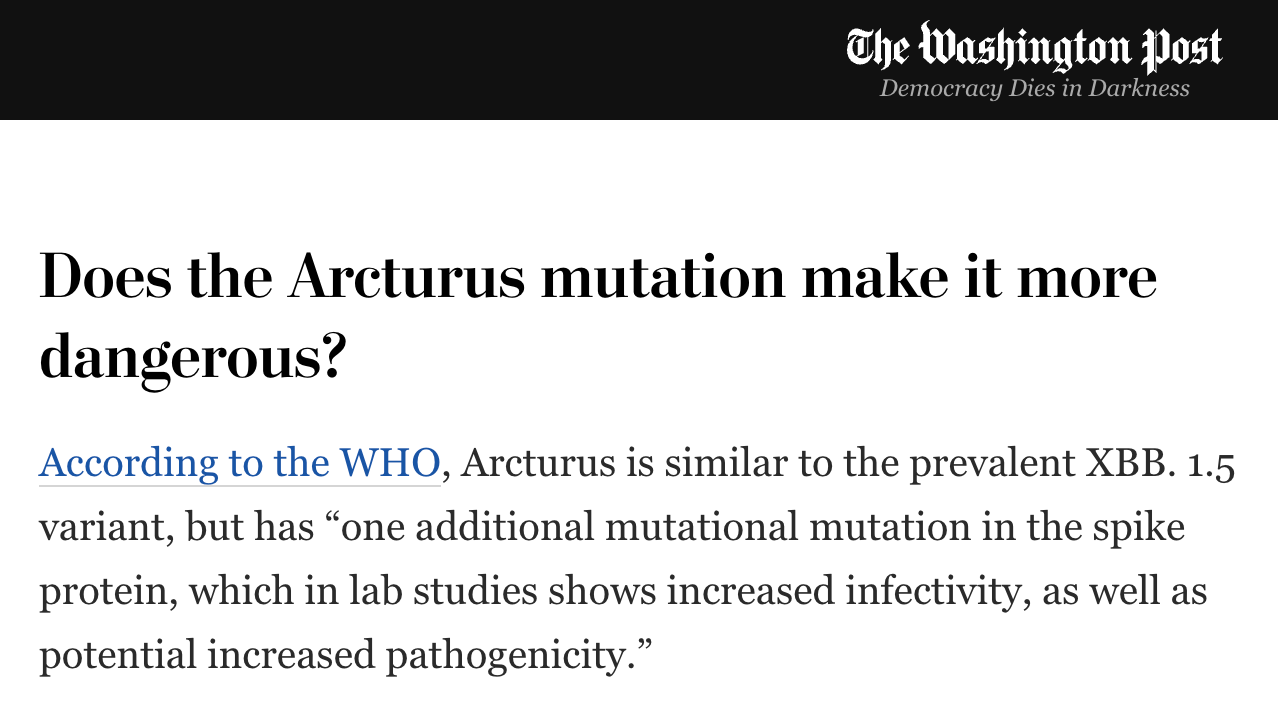Curiously curious
« previous post | next post »
Victoria Bisset, "What to know about Arcturus, a new coronavirus subvariant the WHO is tracking", WaPo 4/14/2023:
According to the WHO, Arcturus is similar to the prevalent XBB. 1.5 variant, but has “one additional mutational mutation in the spike protein, which in lab studies shows increased infectivity, as well as potential increased pathogenicity.”
Daniel Deutsch, who sent in the link, commented that "A cursory search for 'mutational mutation' yielded no definitional definition."
The WaPo quotation is taken from the transcription of a "WHO press conference on COVID-19 and other global health issues – 29 March 2023", available as a video on YouTube. And the transcriptional transcription at that link does contain the cited modificational modification [emphasis added]:
One of the variants that we are looking at, and I think you specifically mentioned India, is a variant that we have under monitoring. This is the XBB.1.16. It’s actually very similar in profile to XBB.1.5. It has one additional mutational mutation in the spike protein which in lab studies shows increase infectivity, as well as potential increased pathogenicity. So, it’s one that we are monitoring and we’re monitoring it because it has potential changes that we need to keep a good eye out on.
The above paragraph starts at 26:32 in the video — but the recording does not include the superfluous superfluity:
It has one
uh additional mutation in the spike protein
So it's an error in the transcriptional transcription, not in the fault of an editorial editor at the World Health Organization or at the Washington Post.
There's one other transcriptional error in the same sentence — the speaker (Dr. Maria Van Kerkhove) says "shows increased infectivity", rather than "shows increase infectivity":
The subsitution of "increase" for "increased" is a common sort of typing error, as a well as the sort of mistake that it's relatively easy for ASR systems to make. But inserting an extra modifier seems less likely, for either humans or machines.
The obligatory screenshots — WaPo:
WHO:


Don said,
April 15, 2023 @ 6:57 am
At the risk of stating the obvious, I guess this must have been the result of interference from “additional”: the person doing the transcribing got to the “tion” in “mutation” and thought they were still at the “tion” in “additional”. I think I’ve experienced the same kind of brain glitch before.
unekdoud said,
April 15, 2023 @ 1:07 pm
Isn't this the kind of mutation that tends to occur in genetic material, where fragments with a longer common subsequence are more likely to replace the correct ones?
J.W. Brewer said,
April 15, 2023 @ 4:42 pm
I feel like "mutational mutation" has an implicature (via various Gricean steps) of the potential existence of a "non-mutational mutation," which I would be interested in learning more about.